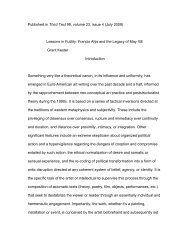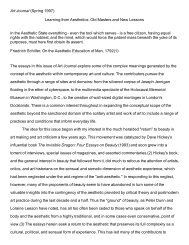Art Journal interview with Mick Wilson - Grant Kester
Art Journal interview with Mick Wilson - Grant Kester
Art Journal interview with Mick Wilson - Grant Kester
Create successful ePaper yourself
Turn your PDF publications into a flip-book with our unique Google optimized e-Paper software.
of awful, depoliticized, hierarchically imposed, state-sponsored "community"<br />
art that we see spreading in the UK). This is the basis for my criticism of earlier<br />
community-based practices, but it's clear that the question of patronage needs<br />
to be revisited. At this point I'm just trying to educate myself about the current<br />
situation in the UK and the rest of the EU, especially around regeneration projects<br />
of various kinds. I would note that the general trajectory of neoliberalism is<br />
dearly toward the ongoing erosion of this sort of state provision. The pressures<br />
on EU countries are already building, and one of the first things to go will likely<br />
be art funding, as it was in the US. Of course the neoliberal juggernaut is asynchronous.<br />
Some European countries still manage to retain remnants of the postwar<br />
social compact, subsidizing higher education, housing, the arts, health<br />
care, and so on. But their ability to maintain the standard of living of their middle<br />
classes is tenuous at best. Even now the nations of the EU find themselves<br />
increasingly reliant on the cheap labor of foreign immigrants, leading to the<br />
entirely predictable but no less depressing spectacle of anti-immigrant racism in<br />
historically tolerant cultures like those of Holland and Ireland. One of the chief<br />
goals of neoliberal orthodoxy is to eliminate any and all forms of collective resistance<br />
to the primacy of capital. Within this movement the state and civil society<br />
have taken on a central role as zones of contestation and targets of conquest by<br />
corporate power. There are significant battles to be waged in this struggle, which<br />
is why reductive analyses of patronage are so counterproductive. Of course public<br />
institutions are compromised, but they're more accountable, more vulnerable<br />
to external control, than the corporate sector. It simply takes time and patience.<br />
The far-right wing in the US took power over a period of two decades by building<br />
local organizations, first in congregations and school boards, then at the state<br />
level, and finally at the federal level. At this point the federal government has<br />
almost entirely abandoned any substantive regulative relationship to the private<br />
sector. The Bush administration literally invites corporate lobbyists to write the<br />
legislation that is intended to regulate their industries. Our government has<br />
effectively been taken over by corporate America. I'd like to think things haven't<br />
gotten quite this bad in Ireland or the UK, and I sincerely hope that my country<br />
doesn't set the precedent for Europe in this regard. But this means addressing the<br />
function of public institutions <strong>with</strong> some tactical and strategic sophistication,<br />
rather than throwing your hands up and dismissing all forms of funding outside<br />
the private art market or state-sponsored biennials as impure or hopelessly<br />
compromised.<br />
<strong>Grant</strong> <strong>Kester</strong> is associate professor of art history and coordinator of the PhD program in art and media<br />
history, theory, and practice at the University of California, San Diego. His books include <strong>Art</strong>, Activism, and<br />
Oppositionality: Essays from Afterimage (Duke University Press, 1998) and Conversation Pieces: Community<br />
and Communication in Modem <strong>Art</strong> (University of California Press, 2004). He was chief curator and project<br />
editor for Groundworks: Collaboration in Contemporary Environmental <strong>Art</strong> at the Regina Gouger Miller Gallery<br />
at Carnegie Mellon University (2005). <strong>Kester</strong>'s current book project is The One and the Many: Agency and<br />
Identity in Contemporary Collaborative <strong>Art</strong>.<br />
<strong>Mick</strong> <strong>Wilson</strong> has recently taken up the position of head of fine art at the Dublin Institute of Technology,<br />
having previously been the head of research and postgraduate development at the National College of <strong>Art</strong><br />
and Design, Ireland. He works as an educator, writer, and artist across a variety of media. Recent essays<br />
include "Curatorial Moments and Discursive Turns" in Curating Subjects, edited by Paul O'Neill (de Appel/<br />
Open Editions, 2007) and "Invasion of the Kiddyfiddlers" in Censoring Culture: Contemporary Threats to Free<br />
Expression, edited by Robert Atkins and Svetlana Mintcheva (New Press, 2006).<br />
118 FALL 2007




